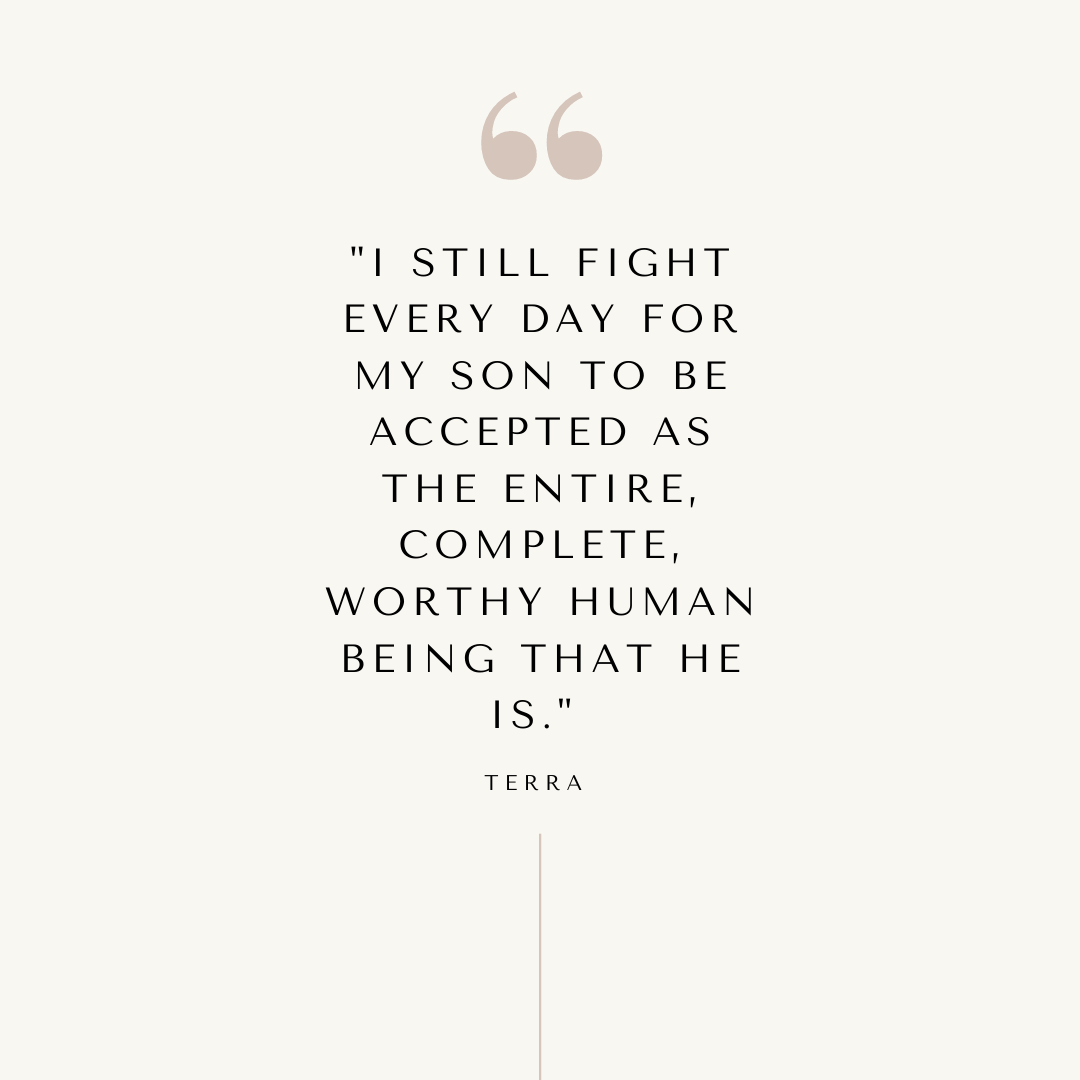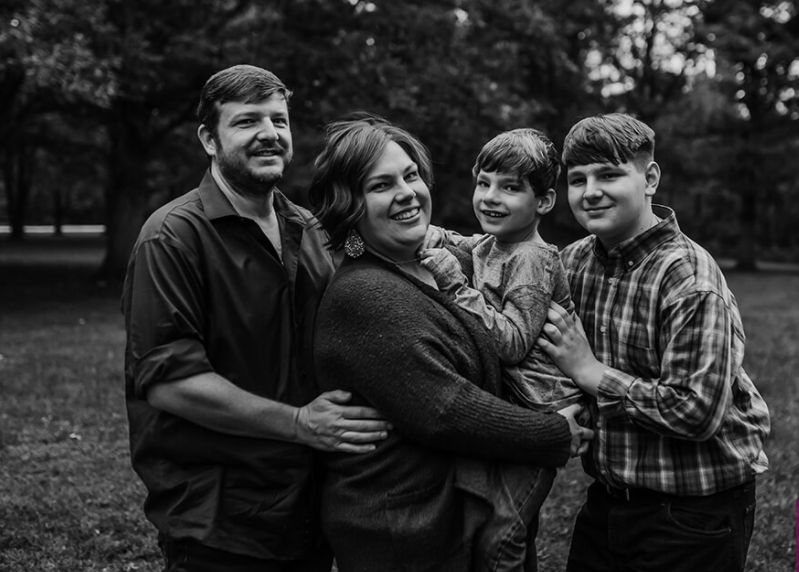All I Want for April is Acceptance.
Thank you to my dear friend Terra for writing this piece so we can all learn from her. You can follow her podcast Normal with Autism, on Instagram for more amazing content.
All I want for April is acceptance.
In March of 2014, I sat in a small sterile office at the local children’s hospital with my husband and youngest son. He was 2 1/2 years old at the time, and we were waiting for the conclusions of an autism screening that involved several helping professionals and lasted 4 hours.
We wanted to hear the good news that all the therapies and work we completed over the last 12 months paid off in helping him catch up developmentally.
In March of 2013, my son Finn was diagnosed with epileptic encephalopathy. A hazardous form of epilepsy that impacts his learning and development in very negative ways. I stopped working as a mental health therapist and devoted myself to being his full-time caregiver. I spent many hours and days with Finn in therapies and doctor visits, working on everything from speech to matching skills. It was all to help his development move forward as his seizures had significantly impacted his growth.
We sat waiting for the developmental doctor to give us the results; I held my breath, hoping for good news. Her following statement, Finn has severe autism and needs help right away, was not a surprise, but it was not what I wanted to hear. His actual written report included the statement “Finn is at great risk for mental retardation…” should he not receive interventions. I remember leaving the office confused and grief-struck. I was confused because I could not fully grasp what it meant for my child to have an autism diagnosis. Grief-stricken because of the looks on the physicians’ faces, I knew it wasn’t good.
Today, in 2021, I can tell you I thought his autism diagnosis was a tragedy in 2014. I am a mental health professional, and I did not know a lot about autism. I knew enough to understand it wasn’t something you wanted your 2-year-old to be diagnosed with. I also knew enough to know that the words the doctors used at the time to describe his high support needs scared me into many sleepless nights figuring out how to get him into full-time behavior therapy as quickly as I could. I also felt less alone when people bought puzzle piece cookies or wore blue on April 2nd, world autism awareness day. My friends would tag me in posts saying they were lighting it up blue for Finn. In the end, I do not fault them at all. And I realize now those efforts were about me and not about what my son needed.
Today, I know better. Now, I know that my son being autistic is not a disaster. Autism is not the catastrophe that I pictured. What is distressing is that seven years later, I still fight every day for my son to be accepted as the entire, complete, worthy human being that he is. Even more problematic is the knowledge that as he gets older and bigger on his way to becoming an adult disabled male, some in my local community will fear him simply because he is autistic. Acceptance will grow rarer as the years pass.
Why, after all these years, puzzle pieces, and lighting it up blue, is it still difficult for autistic people to be accepted? The difference is the passive awareness that many folks still engage in and the active acceptance that is harder to do but worth the work. An author for an Autistic Self Advocacy Network (ASAN) post states, “Awareness is all about creating a sense of urgency and fear. Awareness efforts present us as a problem to be solved…Acceptance comes from a place of understanding…Understanding takes work. People first need to acknowledge us as individuals- three-dimensional, growing, developed characters. We are not all the same, and we are not but a collection of deficits.”
My son is not broken, and he is not a collection of deficits or things he can not do. What would life be like for your child if the only focus from the adults in their lives were on what milestones they did not reach? If you ever want to find out, I invite you to join me in the next Individual Education Plan (IEP) meeting with my local school district.
You might be asking me now, “Terra, what can I do instead of light it up blue for April?” Here are some questions to ask yourself and ways to practice acceptance of autistic people every day.
First, ask, “Do I rely on autistic people or their caregivers to educate me about autism?” If the answer is yes, you have some work to do. Start with a book by an actually autistic individual. “The Reason I Jump” is a great one. While writing this, I googled “autistic authors,” and I need to get to my local bookstore soon. The list I found is extensive.
Second, if you are a leader in a community space (i.e., church), ask yourself, “How would my organization respond if a family and their autistic loved one walked into this space tomorrow to hang out with other members in their community?” For example, if you are a church, would the autistic loved one be welcomed into the worship space just as they to hear the message from the pastor. If the answer is no, you have some work to do. Many families with autistic loved ones experience conditional acceptance based on ignorance and lack of willingness to make space for that family to show up fully as themselves. Ask how you and your other community leaders how can we support that family in a way that treats them like everyone else.
Finally, ask yourself do autistic folks and organizations that actually support autistic people show up in your social media feed. If the answer is no, you have some work to do. Some of my favorite folks to follow are https://www.instagram.com/the.autisticats/
And a great organization to check out is autisminblack.org
Acceptance is a verb. Do the work. Take the action. My son and all the kids and adults like him thank you in advance.
More about Terra: I am a wife, mom, podcaster, writer, therapist, daughter and friend. I work hard to keep all those plates spinning and humor is my coping skill.
My two boys, Q and Finn are my favorite human beings on the planet. Finn was diagnosed with epilepsy and autism before he turned three years old. He is a non-speaking kid that has a lot to say. Q is growing up way to fast and likes to bring it up every day by saying how much taller he is than me. My husband and I have been together since we were 19. Our family motto is “Making it up as we go along”.




